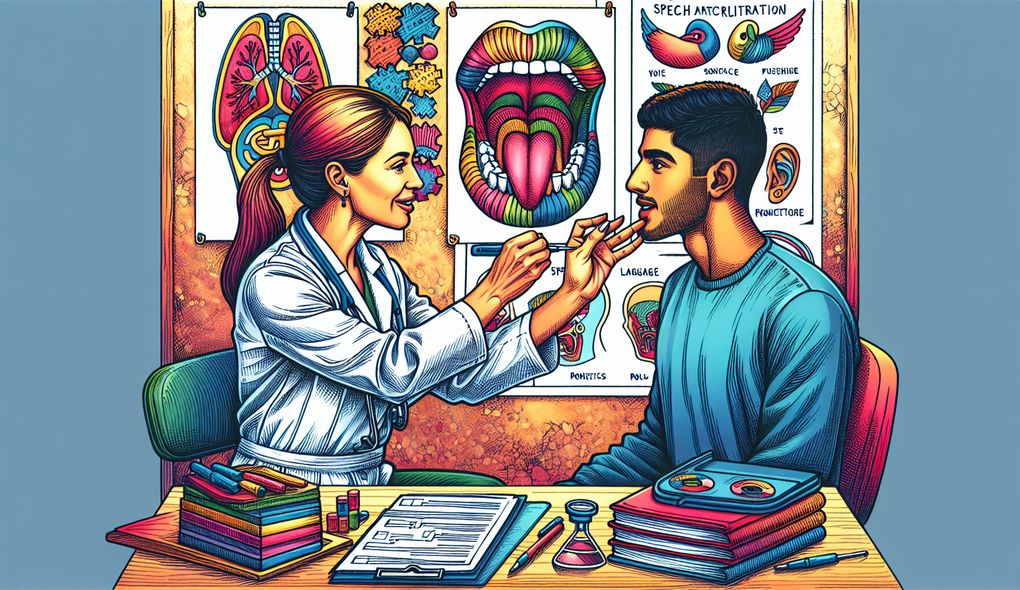Can you give an example of your experience working with children with speech and language disorders?
INTERMEDIATE LEVEL

Sample answer to the question:
Yes, I have experience working with children with speech and language disorders. In my previous role as a Speech-Language Pathologist, I worked with a diverse group of children ranging from 3 to 10 years old. One notable experience was working with a 5-year-old boy named Lucas who had a severe speech delay. I conducted an initial assessment to evaluate his speech abilities and identified specific areas of improvement. Using evidence-based treatment protocols, I designed a personalized care plan for Lucas that focused on articulation exercises and language comprehension activities. Over the course of several months, I worked closely with Lucas during therapy sessions, providing him with targeted interventions and constant support. I also collaborated with his parents, providing them with strategies to reinforce his progress at home. Through consistent therapy and parental involvement, Lucas made significant improvements in his speech and language skills. It was incredibly rewarding to witness his growth and see him gain confidence in his ability to communicate effectively.
Here is a more solid answer:
Absolutely! I have extensive experience working with children facing speech and language disorders. During my tenure as a Speech-Language Pathologist, I had the opportunity to work with a diverse group of children, including those with speech delays, language disorders, and cognitive communication difficulties. One remarkable experience was working with a 7-year-old girl named Sophia, who had a language disorder. Through a comprehensive evaluation, I identified the areas of concern and developed a tailored treatment plan focusing on improving her expressive and receptive language skills. I incorporated various evidence-based techniques such as visual supports, language modeling, and play-based interventions to make therapy engaging and effective for Sophia. Additionally, I collaborated with her parents to provide them with strategies to reinforce therapy goals at home. Over time, Sophia showed remarkable progress, and her communication abilities significantly improved. I am skilled in utilizing alternative communication systems and augmentative communication devices to enhance the communication abilities of children like Sophia. Furthermore, I value cultural competence and sensitivity in my practice, recognizing that each child comes from a unique cultural background that impacts their communication. By adapting therapy approaches to align with cultural norms and values, I ensure that the children receive comprehensive and culturally-sensitive care.
Why is this a more solid answer?
The solid answer provides specific examples of the candidate's experience working with children with speech and language disorders. It highlights their ability to develop and implement individualized care plans, their knowledge of alternative communication systems and augmentative communication devices, and their cultural competence and sensitivity in a healthcare setting. However, the answer can still be improved by providing more details on the candidate's experience working with diverse populations and age groups.
An example of a exceptional answer:
Certainly! I have a wealth of experience working with children with speech and language disorders. As a dedicated Speech-Language Pathologist, I have had the privilege of working with a diverse range of children across various age groups and cultural backgrounds. For instance, I worked extensively with a 4-year-old boy named Noah who had apraxia of speech, a motor-based speech disorder. After conducting a thorough assessment, I devised a comprehensive treatment plan that included oral motor exercises, phonological awareness activities, and the use of augmentative communication devices to facilitate Noah's speech production. Through consistent therapy sessions and collaboration with his parents, Noah's speech abilities improved significantly, and he gained confidence in his communication skills. In addition to Noah, I have also worked with children from bilingual households, tailoring therapy approaches to their individual language needs and cultural context. I find it crucial to foster cultural competence and sensitivity in my practice, as it promotes effective communication interventions and ensures that each child receives personalized care. I constantly seek professional development opportunities to stay up-to-date with the latest research and treatment techniques, allowing me to provide evidence-based care to children with speech and language disorders.
Why is this an exceptional answer?
The exceptional answer demonstrates the candidate's extensive experience and expertise in working with children with speech and language disorders. The answer showcases their ability to develop individualized care plans, their knowledge and utilization of alternative communication systems and augmentative communication devices, and their cultural competence and sensitivity in a healthcare setting. The answer also highlights the candidate's experience working with diverse populations and age groups, including children with apraxia of speech and those from bilingual households. The candidate's commitment to professional development and evidence-based practice further enhances their exceptional answer.
How to prepare for this question:
- Familiarize yourself with evidence-based treatment protocols for speech and language disorders to demonstrate your knowledge in this area.
- Reflect on your past experiences working with children with speech and language disorders and prepare specific examples to share during the interview.
- Research and familiarize yourself with alternative communication systems and augmentative communication devices commonly used in speech-language pathology.
- Consider how you can adapt your therapy approaches to align with cultural norms and values, showcasing your cultural competence and sensitivity.
- Stay updated with the latest research and developments in the field of speech-language pathology by engaging in continuing education and professional development opportunities.
What are interviewers evaluating with this question?
- Experience working with children with speech and language disorders
- Ability to develop and implement individualized care plans
- Knowledge of alternative communication systems and augmentative communication devices
- Cultural competence and sensitivity in a healthcare setting

